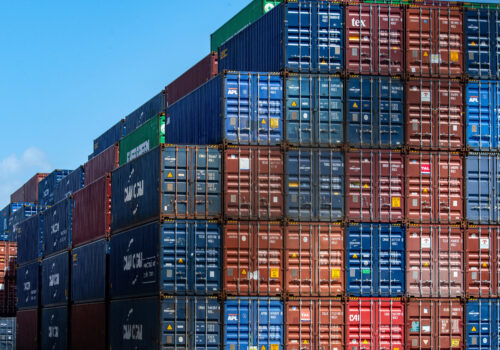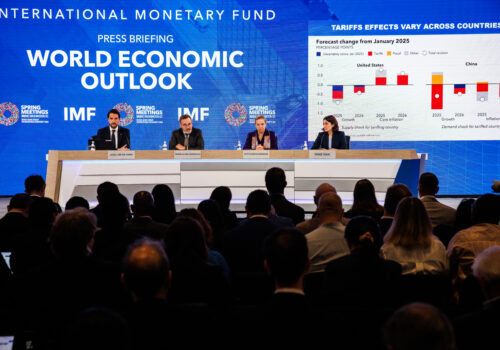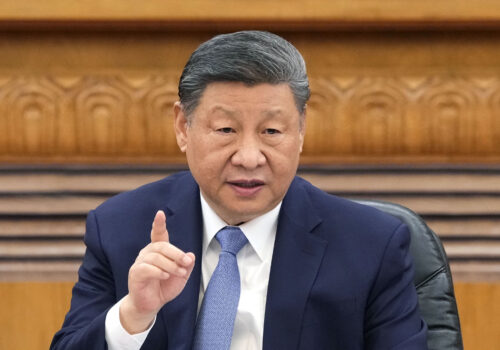What to make of the respite in the US-China trade war
JUST IN
It’s a dramatic de-escalation. On Monday, the United States and China announced that they will temporarily reduce the tariffs the two countries have imposed on one another for ninety days. As US-Chinese trade negotiations continue, Washington will lower its tariffs on Chinese goods from 145 percent to 30 percent, while Beijing will reduce its tariffs on the United States from 125 percent to 10 percent. Global markets reacted positively to the deal reached after talks between US and Chinese officials this past weekend in Geneva. “The consensus from both delegations is that neither side wanted a decoupling,” US Treasury Secretary Scott Bessent said after the talks concluded. Below, our experts decouple the signal from the noise of this major de-escalation of the US-China trade war.
TODAY’S EXPERT REACTION BROUGHT TO YOU BY
- Josh Lipsky (@joshualipsky): Chair of international economics at the Atlantic Council, senior director of the GeoEconomics Center, and former adviser to the International Monetary Fund
- L. Daniel Mullaney: Nonresident senior fellow with the Europe Center and GeoEconomics Center, and former assistant US trade representative
- Barbara C. Matthews: Nonresident senior fellow at the GeoEconomics Center and former US Treasury attaché to the European Union
- Hung Tran: Nonresident senior fellow at the GeoEconomics Center and former IMF official
Why it happened
- Put aside gross domestic product data and stock market swings: Josh tells us that the real motivator for the United States to strike a deal “was the prospect of missing backpacks, sneakers, and T-shirts at Walmart and Target just as parents start back-to-school shopping.” Similarly, China was motivated by increasing “layoffs across ports and factories in southern China.”
- In Dan’s view, the deal also indicates that the Trump administration’s trade policy “is less about the tariffs per se,” or decoupling from the Chinese economy, than it is about reducing the trade deficit, tackling trade barriers, and more. “Broad tariffs are a ready and powerful tool for achieving these objectives, but a crude one that inflicts self-harm,” making it “less desirable than other arrangements.”
- In that sense, Barbara sees two important positives emerging from Geneva. Both the United States and China agree that they cannot “afford to pursue long-term decoupling and trade diversion.” And they “also now tacitly agree that the trade imbalances created over the course of the last few decades must be addressed.”
- Dan adds that the agreement also sends a message to other countries considering how to approach this administration: “Trading partners that immediately started negotiations instead of retaliating are in as good a position, if not better, than China, which chose to retaliate” and suffered the harm of these punishing tariffs.
Sign up to receive rapid insight in your inbox from Atlantic Council experts on global events as they unfold.
The next 90 days
- While the administration is claiming that it can strike a deal within the next ninety days, Josh points out that the US-China deal from Trump’s first term took two years, “and this one is more complex in scope and will address fentanyl, technology, semiconductors, and more.”
- But this idea of turning US-China trade on and off “like a light switch is going to cause some short-circuiting,” Josh says. He predicts a surge of imports this summer as retailers try to beat the resumption of these punishing levies. “It’s very difficult to run a global economy with this kind of uncertainty.”
- Meanwhile, Barbara is keeping her eye on the rest of the world. “Third countries over the next few months will be under increased pressure to choose a side between the United States and China.” This was on display in the US-UK deal announced last week and other US negotiations with allies, amid “Chinese efforts to solidify the economic heft and geoeconomic stature of the BRICS economies.”
- With US-European negotiations “not gaining any traction,” Josh notes, “this puts Brussels in the hot seat.”
What’s old is new again
- Hung says today’s announcement confirms “that the world has moved into a bilaterally managed trading system based on reciprocity—with no references to previously agreed multilateral rules nor the World Trade Organization.” These deals are also not codified into treaties or law, which “adds to the uncertainty about how robust and sustainable those agreements can be.”
- Indeed, the arrangement reminds Dan of US-China dealings before China joined the World Trade Organization, when trade relations relied on annual renewal of “most favored nation” status. “There was significant trade but hobbled by the unpredictability of the tariff regime.”
- The result is “likely to reduce trade volumes, especially shipments to the United States, which would cut its trade deficit” as the Trump administration wants, Hung says. But it will also likely result in the “weakening of global growth prospects.”
- The participants are different, but the “negotiating dynamic remains the same,” Barbara says, as the 1944 Bretton Woods agreement. “The outcome will also achieve the same overall purpose: to restructure the geoeconomic balance of power. One can only hope that the deals struck over the next few months prove to be as durable as the original Bretton Woods agreement.”
Further reading
Tue, Apr 22, 2025
Is the global economy headed for a reset, recession, or both?
Fast Thinking By
The International Monetary Fund has just released its latest World Economic Outlook. Atlantic Council experts dig into the details.
Fri, Apr 11, 2025
Want to understand the US-China trade war? Start with soybeans and batteries.
New Atlanticist By
As Washington and Beijing hit each other with new tariffs, two goods—soybeans and lithium-ion storage batteries—offer a window into the larger trade war.
Thu, Apr 10, 2025
China is ready to ‘eat bitterness’ in the trade war. What about the US?
New Atlanticist By Dexter Tiff Roberts
As the US imposes a 145 percent tariff on Chinese imports, officials in Beijing are turning to a belief that Chinese people will endure hardships in service of a national goal.
Image: US Secretary of the Treasury Scott Bessent and US Trade Representative Jamieson Greer address the media after trade talks with China in Geneva, Switzerland on May 11, 2025. Photo via Keystone/EDA/Martial Trezzini/Handout via Reuters.




